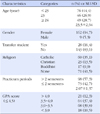Abstract
Purpose
This study was done to: (a) identify levels of emotional labor that nursing students perceived when caring for patients in the hospital during their nursing practicum, (b) examine the impact of emotional labor on burnout, and (c) identify the possible moderating effect of emotional intelligence on the relationship between emotional labor and burnout for nursing students.
Methods
A descriptive study was conducted with a sample of 171 students enrolled in a 4-year undergraduate nursing program in one university located in Korea, and had a practicum experience at least one semester before the study began. Data were collected with self-report questionnaire, and analyzed with SPSS 21.0 program, using hierarchical multiple regression.
Results
Mean score for emotional labor was 3.17 with a range of 1 to 5. For nursing students, emotional labor significantly affected burnout in the nursing practicum (F=15.763, p<.001), and explained 30.1% of the variance in burnout. The degree of emotional intelligence acted as a moderator on the relationship between emotional labor and burnout at significant level (F=15.345, p<.001).
Figures and Tables
References
1. Song JH, Kim MW. Study on clinical education for nursing in hospitals in Korea. J Korean Acad Soc Nurs Educ. 2013; 19(3):251–264. DOI: 10.5977/jkasne.2013.19.2.251.
2. Korean Educational Development Institute, Statistical yearbook of education 2013. Annual turnover of students (undergraduate course) [Internet]. Seoul: Korean Educational Development Institute;cited 2014 October 1. Available from: http://kess.kedi.re.kr/eng/publ/view?survSeq=2013&menuSeq=3894&publSeq=2&itemCode=02&menuId=0&language=en#.
3. Ha NS, Han KS, Choi J. The relationship of perceived stress, ways of coping, and stress response of nursing students. J Korean Acad Nurs. 1998; 28(2):358–368.
4. Kang BO, Ji SA. Experiences and process of patients' healing relation with nurses. J Korean Acad Nurs Adm. 1995; 1(1):112–131.
5. Msiska G, Smith P, Fawcett T. Exposing emotional labour experienced by nursing students during their clinical learning experience: A Malawian perspective. Int J Afr Nurs Sci. 2014; 1:43–50. DOI: 10.1016/j.ijans.2014.07.001.
6. Hochschild AR. The managed heart: commercialization of human feeling. Berkeley: University of California Press;1983.
7. Morris JA, Feldman DD. Managing emotions in the workplace. J Manag Issue. 1997; 9(3):257–274.
8. Lee YH. Antecedent and consequences of emotional labor in head coaches of NCAA Division I program [dissertation]. Ohio: The Ohio State University;2012.
9. Kim YJ. Influence of burnout on the relationship of emotional labor and customer orientation: Focusing on airlines employees. Gyeonggi-do: Kyungwon University;2010.
10. Zamanzadeh V, Valizadeh L, Sayadi L, Taleghani F, Howard F, Jeddian A. Emotional labour of caring for homatopoietic stem cell transplantation patients: Iranian nurses' experiences. Asian Nurs Res (Korean Soc Nurs Sci). 2013; 7:91–97. DOI: 10.1016/j.anr.2013.04.004.
11. Yang FH, Chang CC. Emotional labour, job satisfaction and organizational commitment among clinical nurses: A questionnaire survey. Int J Nurs Stud. 2008; 45:879–887. DOI: 10.1016/j.ijnurstu.2007.02.001.
12. Kim IS. The role of self-efficacy and social support in the relationship between emotional labor and burn out, turn over intention among hospital nurses. J Korean Acad Nurs Adm. 2009; 15(4):515–526.
13. Yang YK. A study of burnout, emotional labor, and self-efficacy in nurses. J Korean Acad Nurs Adm. 2011; 17(4):423–431. DOI: 10.11111/jkana.2011.17.4.423.
14. Byun DS, Yom YH. Factors affecting the burnout of clinical nurses: Focused on emotional labor. J Korean Acad Nurs Adm. 2009; 15(3):444–454.
15. Park HJ. Emotional labour, emotional expression and burnout of clinical nurses. J Korean Acad Nurs Adm. 2009; 15(2):225–232.
16. Grandey AA. Emotion regulation in the workplace: A new way to conceptualize emotional labor. J Occup Health Psychol. 2000; 5:95–110. DOI: 10.1037/1076-8998.5.1.95.
17. Park KS, Hwang YY, Choi EH. The study of the nursing students' lived experience of clinical practice at the intensive care unit. J Korean Acad Adult Nurs. 2003; 15(3):373–382.
18. Jack K, Wibberley C. The meaning of emotion work to student nurses: A Heideggerian analysis. Int J Nurs Stud. 2014; 51:900–907. DOI: 10.1016/j.ijnurstu.2013.10.009.
19. Baik DW, Yom YH. Effects of social support and emotional intelligence in the relationship between emotional labor and burnout among clinical nurses. J Korean Acad Nurs Adm. 2012; 18(3):271–280. DOI: 10.11111/jkana.2012.18.3.271.
20. Oh SE. Emotional intelligence, emotional labor and burnout of clinical nurse [master's thesis]. Suwon: Ajou University;2013.
21. Ahn EM. The Relationship between Emotional labor, Burnout, Job satisfaction of nurses at long term care hospital[master's thesis]. Suwon: Ajou University;2013.
22. Mayer JD, Salovey P. What is emotional intelligence?. In : Salovey P, Sluyter DJ, editors. Emotional development and emotional intelligence: Educational implications. New York: Basic Books;1997. p. 3–31.
23. Wong C, Law KS. The effect of leader and follower emotional intelligence on performance and attitude: An exploratory study. Leadersh Q. 2002; 13:243–274. DOI: 10.1016/S1048-9843(02)00099-1.
24. Ahn SA, Yea CJ, Yeom DM. The impact of nurses' job demands, job resources, emotional labor and emotional intelligence on burnout. Soc Sci Res Rev. 2011; 27(4):25–43.
25. Bae BR, Kim NG. The influences of service provider's emotional labor on burnout and customer orientation: Moderating effects of emotional intelligence. J Ind Econ Bus. 2012; 25(1):497–521.
26. Kim MJ. Effects of the hotel employee's emotional labor upon the job-related attitudes. J Tourism Sci. 1998; 21(2):129–141.
27. Baik DW. The effects of social support and emotional intelligence in the relationship between emotional labor and burnout among clinical nurses[master's thesis]. Seoul: Chung-Ang University;2012.
28. Maslach C, Jackson SE. The measurement of experienced burnout. J Occup Behav. 1981; 2:99–113. DOI: 10.1002/job.4030020205.
29. Heo YM. Factors affecting the burnout of nurses in cancer wards [master's thesis]. Jinju: Gyeongsang National University;2013.
30. Baron RM, Kenny DA. The moderator-mediator variable distinction in social psychological research: Conceptual, strategic, and statistical considerations. J Pers Soc Psychol. 1986; 51(6):1173–1182. DOI: 10.1037/0022-3514.51.6.1173.
31. Park SM, Park OI, Moon H. The effect of the emotional intelligence on the relationship between emotional labor and turnover intention of the general hospital nurses. Health Soc Welf Rev. 2013; 33(3):540–564. DOI: 10.1111/j.1468-2397.2012.00900.x.
32. Shin EJ, Park YS. Emotional intelligence, ego resilience, stress in clinical practice of nursing students. J Korea Acad-Ind Coop Soc. 2013; 14(11):5636–5645. DOI: 10.5762/KAIS.2013.14.11.5636.




 PDF
PDF ePub
ePub Citation
Citation Print
Print






 XML Download
XML Download